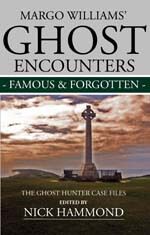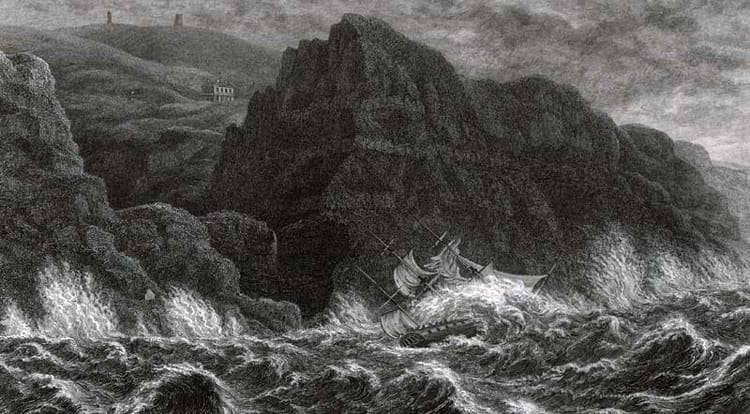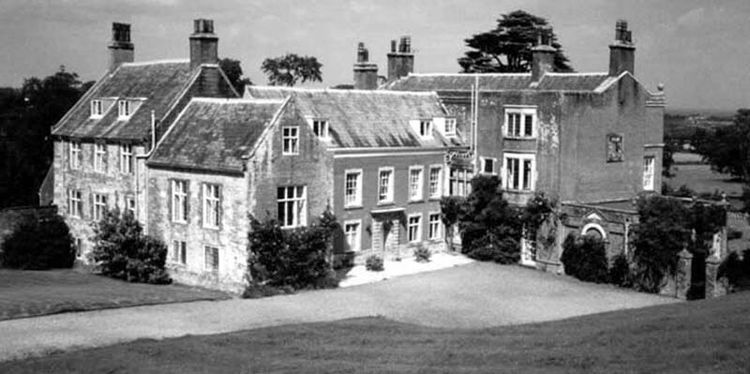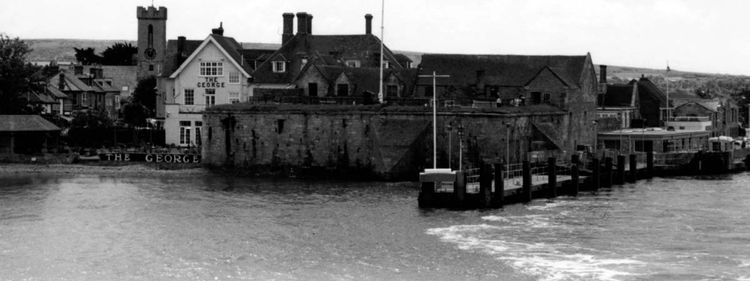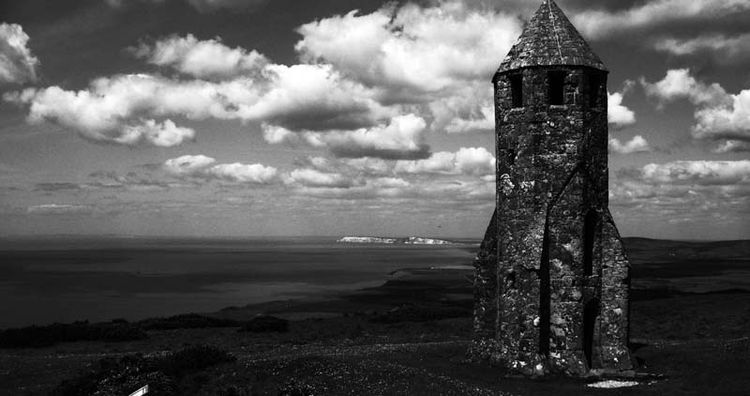Freshwater Bay. Ghosts of the Isle of Wight, with Margo Williams.
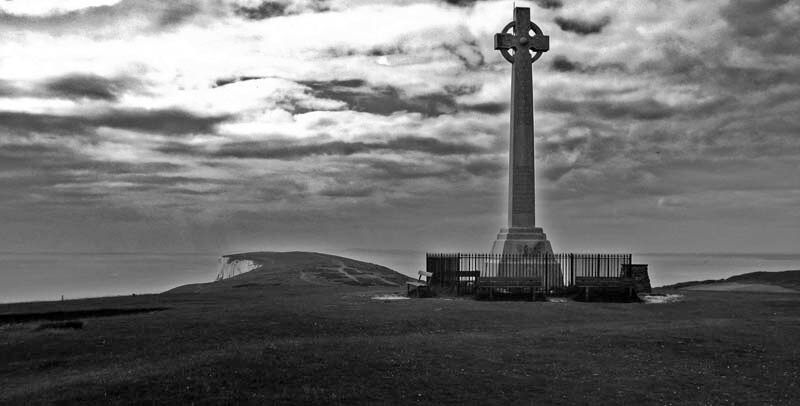
Ghost Ambush on Tennyson Down
DURING WINTER of 1893 an ambush was set to catch a ghostly figure seen wafting the down-land above Farringford House, poet laureate Alfred Tennyson’s Isle of Wight home.
Since he died in October the previous year, there were claims it was the ghost of Tennyson himself.
Others thought different and said it was someone playing a joke, dressing up in the poet’s big hat and green cape.
To resolve the mystery the villagers of Freshwater took turns to watch the paths, but after nights of nothing most were ready to drop the idea and concede the joker had the better of them.
Next cold night their mystery man appeared, as Donald Parr remembers in his excellent book: ‘Ghosts of Hampshire & the Isle of Wight’.
The ghost-hunters were ready when the figure approached through the January mists and came toward their trap. No one dared breathe to make a sound to alert the target. The only noise was their own thump, thump, thump of heartbeat.
Before anyone knew what was what, the figure in big hat and cape breezed directly through the group, oblivious to their calls to stop; and wafted on down the path. “Everywhere suddenly turned cold!” said one ambusher recalling the ghostly encounter.
“It was like a cold damp piece of blotting paper passing through,” shuddered another.
The third man gulped. “I am convinced that what I, and so many others saw and had reported, was the spirit of Lord Tennyson. You see, I knew him so well.”
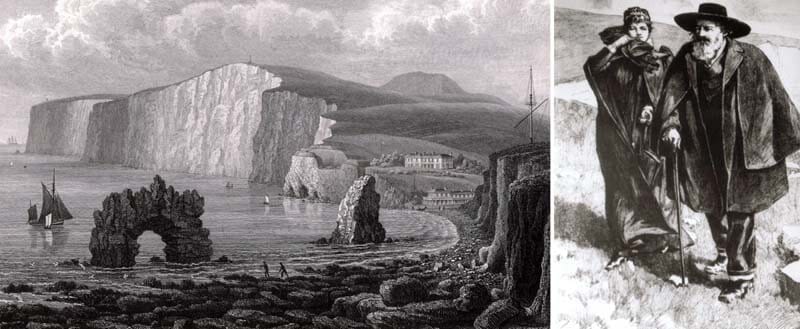
A Ghost on Tennyson Down
No one since has attempted to ambush the ghost of Tennyson Down. Some people of sensitive disposition who visit the memorial that was raised in memory of the poet five years after his death, confirm the site is haunted; say they saw the misted figure in hat and cape.
Others surprisingly claim to have seen a ghostly woman, and make guesses as to her identity.
On a December day, a year or so before my husband died, Walter and I visited the Tennyson monument. Although winter, there was some warmth in the midday sunshine; wind was light and air felt mild.
We sat on a wooden seat close beside the tall Celtic cross that stands on the site of a signal beacon from medieval times. As we chatted I felt a cool ghostly presence brush past me.
“Who are you?” I asked, then received a whispered reply.
I grabbed pencil and a scrap of paper.
“...Margaret, yes Margaret. That is your name too,” he said, interestedly. “It was she who had the cottage built for me at Freshwater. A kindly soul, yet so strange, strange in an artistic way. Dear Julia Margaret Cameron. I was firmly devoted to my work, mostly translations. I needed the solitude from Balliol College. I will speak more as I get used to the idea.”
Walter watched me. “That’s a short message.”
I told him the ghost hadn’t finished.
“What’s he up to?”
“How should I know?” I asked.
The ghost spoke again.
“Had it not been for Margaret, as I call her, Julia she was usually called. Which name do you call her by? She was my saviour, for my work would have suffered. Margaret it must be for me, a pearl.
I wrote so much about the great men so far back. I see the sun rise and the sun set, so beautiful. Yet that is not the only beautiful thing I see. So important, those ancient men, so important. You will find out one day, as you will find out about the ancient Gods you do not believe in. But you will.
My name is Jowett. My work was so important to me, and to many others I hope. Yet you would not be familiar with it. Peace, quiet and solitude I was able to obtain in that delightful cottage, and of course on the downs, the spectacular downs where I gaze over the sea.
It is now goodbye. Your time has not been wasted.”
The ghost provided personal details by which Walter could attempt to identify him. A surname, Jowett, the word Balliol, and the name of someone who lived in the area: Julia Margaret Cameron.
Identifying the Dead. Benjamin Jowett
On returning home, Walter wrote to the archive department at Oxford University’s Balliol College to enquire if Jowett was on file. He received reply.
Benjamin Jowett was Master of Balliol College in the 1870s and later appointed Vice Chancellor of the university. His reference to “ancient men and Gods” then became clear for Jowett specialised in Greek history, he was Regius Professor in the subject.
Highly regarded in academic circles for his translations of philosophers Plato and Aristotle.
Local records confirmed Mrs Julia Margaret Cameron lived in Freshwater at that time and built a cottage for Jowett in the village, named ‘The Porch’ in honour of the ‘Painted Porch’ Stoa Poikile that stood in the ancient Agora of Athens; a giant stone sun and rain shelter beside the public amenity area.
During his residency on the Isle of Wight Benjamin Jowett worked on translations of the Greek philosophers. He is included often in the journals of neighbour Emily Tennyson. He and Alfred were friends until Jowett’s death in 1893.
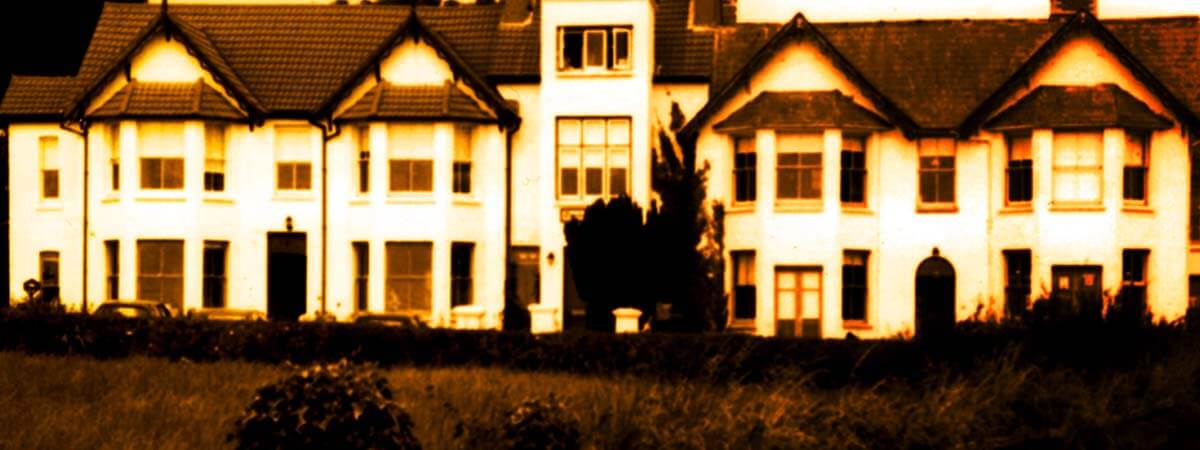
Dimbola Lodge
Victorian letters remembered the sun-drenched Dimbola Lodge garlanded to its roof with roses. Its resident, Mrs Cameron planted primroses and sweet briar, and raised a tower so Dimbola would look beautiful to her friends as they walked up from the bay.
Even nature conspired to create an archway in the water that she might enjoy in the years ahead.
Mrs Watts, wife of Victorian artist G.F. described Mrs Cameron so:
‘To all who knew her she was a unique figure, baffling all description. She doubled the generosity of the most generous of the sisters, and the impulsiveness of the most impulsive. If they were enthusiastic, she was so twice over; if they were persuasive, she was invincible. If she had little of the beauty of her sisters, she certainly had remarkably fine eyes that flashed like her sayings, or grew soft and tender if she was moved.’
Some villagers say she was as much the genius of Freshwater as Alfred, and doubtless he would agree.
She invited, enticed and kidnapped his famous visitors to Dimbola where she posed them as characters in his poems, or anything else that took her fancy; then subjected them to the mysterious processes of photography.
Her friends said she loved everything beautiful; others called her eccentric, though that probably did not trouble the indomitable Mrs C.
In the 21st century Dimbola Lodge Museum continues its role as a world-famous centre for the arts, and eminent artists of all kinds come to exhibit or present talks.
After its re-opening some of those of a sensitive disposition wondered if the weirdly supernatural wafts of chemicals meant the lady of the house remained in residence; still busy with her work.
A Ghost of Dimbola
Others who attended on occasion claimed to smell more ‘earthy’ unearthly odours of putrefaction. However, this particular unpleasantness had nothing to do with Mrs Cameron though perhaps it caused a chuckle from time to time.
During a visit to Dimbola I found the person responsible for that mysterious odour haunting an upstairs room.
“...How funny! They smell the odour of a dead cat I had put in the place to annoy a certain lady who stayed here,” she confessed. “It was a friend of Mrs Cameron who had been so rude to me. I know I was only a local woman who came in to clean. There was a maid who lived in and cooked, but I was just a char.
I did not like being treated so badly by this guest. I found the cat laying dead in the road, coming to work. I hid it in the hedge."
I heard a hearty chuckle.
"Two days later I wrapped it in a piece of cloth. Placed it under the chest of drawers in her room, just enough space. It caused such a smell! The next day the lady left. Mrs Cameron seemed pleased she had gone.
I was a spiteful woman and did many wrong things. Have come back here, find I am trapped. The smell lingers from time to time. Others smell it, just as I. Now I can go on, hoping the smell goes soon. Should not have done this; the weather was hot. Thank you, madam for listening.”
The ghostly char did not provide a name. Her haunting seemed harsh penalty to pay for playing a joke with a decomposing cat, but her admission to being a spiteful woman who did “many wrong things” suggests other reasons for remaining in her post as a ghost.
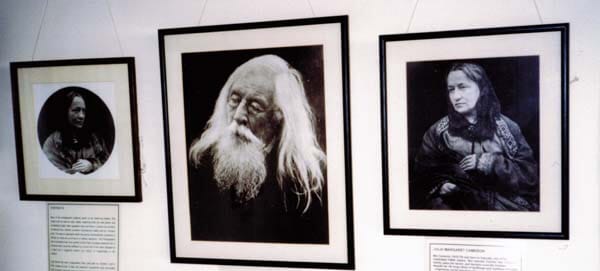
Cause & Consequence
Tennyson shared his opinions on life and death: “There’s something that watches over us, and our individuality endures,” he said.
The ghostly char might add, and those who smelled the consequence of her actions, the fragrances with which it was associated can also stick around for a while, too.
Unfortunately for Alfred, the Camerons did not. The people of Freshwater gathered to watch the couple take their leave of the island in 1875.
On the quay-side as her belongings were carried aboard she handed out her framed photographs in place of cash to tip the porters. “Take these instead as a remembrance,” she said before the ship sailed away and the couple voyaged to distant Ceylon, where she died four years later.
Cause and consequence, so much seems to be in the balance. Things can go one way or another and who knows what chain of causality might have made things different?
What if the cat had not died that hot day, but instead cut across the shady field rather than the road? Would the unpleasant guest have stayed longer?
Could she have persuaded Julia Margaret’s husband Charles Hay to stay rather than return to Ceylon?
The Miracle of Life
And what if the force binding atoms together in the cat was turned a tad more; or the gravity that caused the cat to drop on the roadside was even a fraction less? There would be no cat; no road; no char; no Mrs Cameron; no Alfred.
There would be no sun to light their day; no moon by which to roll his lawns.
The laws of nature are so finely tuned, so perfectly adjusted to the tiniest fraction to make possible life as we know it, and not just for a Freshwater char to pick up a dead cat from the road and find space under a wardrobe.
The cat might not be so philosophical about its fate, but life for us all is a miracle of improbable cause and seemingly impossible consequence since the Big Bang.
Not only did everything get here, somehow, but it got here and fits so amazingly well even old Parmenides would wonder if someone hadn’t put it together, deliberately.
But no.
It is not chance or luck, and especially not design. It is inevitable, so science reminds us; for ours is but one of an infinite number of universes.
The one in which there is just the right tight balance of ingredients to allow a cat rather than a chicken to cross the road at the wrong time at the wrong place.
In another universe it is still alive. In another the Camerons did not leave; in another Ann Oglander was persuaded to stay in Nunwell House; in another her home was demolished by architect Nash.
In another Maurice Bocland married Martha and Knighton Gorges is still in place; Yarmouth church received a nice Gothic tower; Rossetti is Prime Minister and the captain of the Clarendon got to safe harbour before the storm off Blackgang Chine.
It may or may not be a comforting thought that in this universe some people are famous and some people are forgotten; but on this logic there is at least one universe out there in which each of us is famous, fifteen minutes more or less.
Thank you for your company on this short tour of Isle of Wight mysteries and haunting. If you would like to know more about Margo Williams' investigations in Freshwater and other famous and forgotten personages, read this book. Now available from Amazon.
